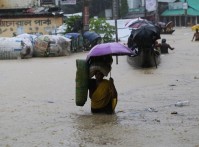-
New Research Explores Causality of Climate-Related Conflict, Effectiveness of Migration
July 29, 2014 By Thomas Curran Migration is an “extreme” form of climate adaptation, but it does pay off for some, write Md. Monirul Islam et al. in a new article in the journal Climatic Change. In a study analyzing two Bangladeshi fishing communities, one long-established, the other the result of migration, the authors examine the effects of climate-induced migration on livelihood vulnerability. Given an equal starting level, they determined the migrants were significantly more resilient 20 years after their resettlement than those that stayed put. “The migrant households are less exposed to climate shocks and stresses than their non-migrant counterparts,” they write, and they “enjoy higher incomes, better health and better access to water supply, health, and educational services.” But not all Bangladeshis can afford to resettle, as the opportunity cost of migration puts their livelihoods and their families’ well-being at risk. In order to alleviate this burden and safeguard their citizens, the authors suggest the government helps resettle people to “carefully chosen destinations that reduce exposure to the impacts of climate variability and change.”
Migration is an “extreme” form of climate adaptation, but it does pay off for some, write Md. Monirul Islam et al. in a new article in the journal Climatic Change. In a study analyzing two Bangladeshi fishing communities, one long-established, the other the result of migration, the authors examine the effects of climate-induced migration on livelihood vulnerability. Given an equal starting level, they determined the migrants were significantly more resilient 20 years after their resettlement than those that stayed put. “The migrant households are less exposed to climate shocks and stresses than their non-migrant counterparts,” they write, and they “enjoy higher incomes, better health and better access to water supply, health, and educational services.” But not all Bangladeshis can afford to resettle, as the opportunity cost of migration puts their livelihoods and their families’ well-being at risk. In order to alleviate this burden and safeguard their citizens, the authors suggest the government helps resettle people to “carefully chosen destinations that reduce exposure to the impacts of climate variability and change.” In the American Journal of Agricultural Economics, Jean-François Maystadt and Olivier Ecker contend there is significant correlation between drought and armed conflict in the Horn of Africa. Recent rainfall failures have lowered the opportunity costs to conflict participation for Somalia’s rural poor, they find. With livestock accounting for some 40 percent of Somalia’s GDP, prolonged drought has made it more enticing to join violent groups like Al Shabab, which offers cash payments and a steady income. They draw two main conclusions from their work: 1) That the causality between climate change and violence, previously studied on a global and regional level, can be “valid also for a single country…at the local level, and over a relatively short period of time”; and 2) that economic well-being correlates directly to conflict participation. There is hope for reducing conflict in Somalia, they conclude, but it must stem from poverty alleviation first.
In the American Journal of Agricultural Economics, Jean-François Maystadt and Olivier Ecker contend there is significant correlation between drought and armed conflict in the Horn of Africa. Recent rainfall failures have lowered the opportunity costs to conflict participation for Somalia’s rural poor, they find. With livestock accounting for some 40 percent of Somalia’s GDP, prolonged drought has made it more enticing to join violent groups like Al Shabab, which offers cash payments and a steady income. They draw two main conclusions from their work: 1) That the causality between climate change and violence, previously studied on a global and regional level, can be “valid also for a single country…at the local level, and over a relatively short period of time”; and 2) that economic well-being correlates directly to conflict participation. There is hope for reducing conflict in Somalia, they conclude, but it must stem from poverty alleviation first.Sources: American Journal of Agricultural Economics, Climatic Change.
 A Publication of the Stimson Center.
A Publication of the Stimson Center.









